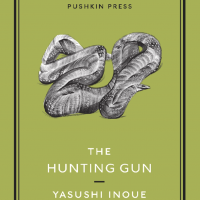Yasushi Inoue's debut novel, "The Hunting Gun," was published in 1949, a year before he won the Akutagawa Prize for his second novel, "The Bullfight." The story — which adopts a similar structure to Ryunosuke Akutagawa's "Rashomon" — consists of three letters sent to Josuke, a married man at the center of a tragic love triangle. These letters are framed by an introduction and epilogue in which Inoue explains how the texts fell into his possession. The first letter is from Shoko, the daughter of the woman Josuke has been having an affair with, Saiko. The second is from Midori, Josuke's wife. The third is from Saiko herself.
The Hunting Gun, by Yasushi Inoue, Translated by Michael Emmerich.
112 pages
PUSHKIN, Fiction.
In this delightful translation, Inoue's flowing prose is duplicitous in its simplicity and his manipulation of the reader through the structure is masterful. Inoue wears his influences loosely and incorporates many of the characteristics that define postwar Japanese fiction: elements of the "I"-novel, existentialist pondering and nods to European aesthetics, leftist politics and the unsettled world of the U.S. Occupation. But Inoue also hints at the unique voice he would go on to develop over his long career.
His understanding of psychology and gift for empathy are evident in all three letters, but particularly the second: Midori is a strong, independent and believable female character — the kind often lacking in Japanese fiction written by men during this era. For that alone this work should be more widely read.


















With your current subscription plan you can comment on stories. However, before writing your first comment, please create a display name in the Profile section of your subscriber account page.